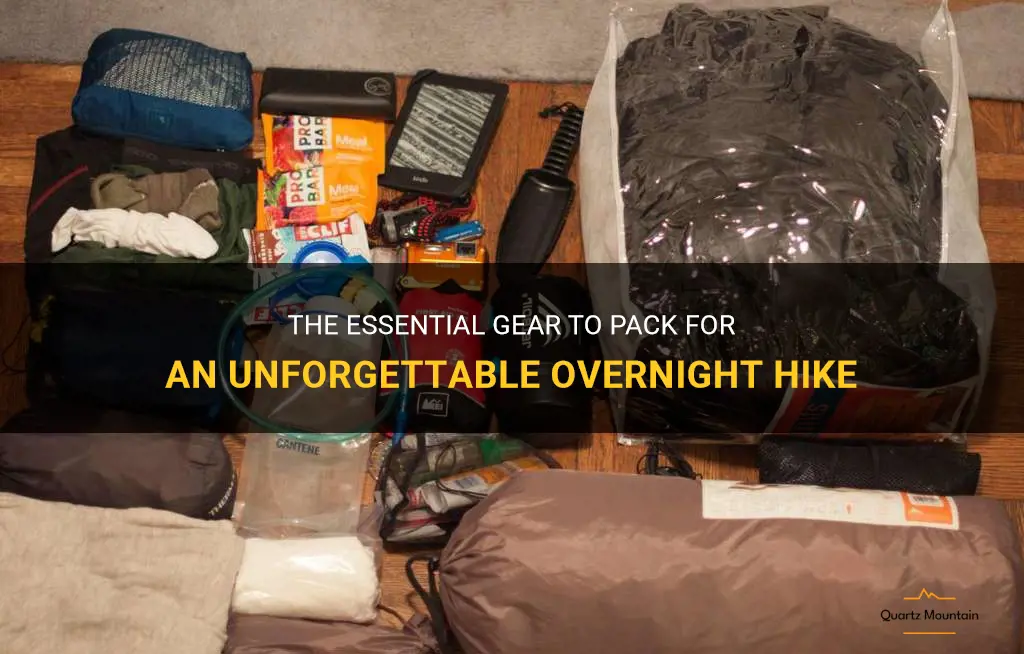
Are you ready to embark on an unforgettable overnight hike? Before you hit the trail, it's essential to ensure you have the right gear packed to make the most of your adventure. From sturdy hiking boots to a reliable tent, we've compiled a list of must-have essentials that will guarantee a safe and enjoyable overnight hike. So get ready to explore the great outdoors and create memories that will last a lifetime with these essential items in your pack.
| Characteristics | Values |
|---|---|
| Clothing | Appropriate hiking clothes, extra pair of socks, rain jacket, hat, gloves |
| Footwear | Hiking boots or trail shoes, extra pair of shoes or sandals |
| Shelter | Tent or bivy sack, sleeping bag, sleeping pad |
| Navigation | Map, compass, GPS device, trail guide |
| Food and water | Backpacking stove, cookware, water filter, water bottles, meal supplies |
| First aid kit | Bandages, antiseptic ointment, pain relievers, insect repellent, sunscreen |
| Emergency supplies | Emergency blanket, whistle, headlamp, fire starter |
| Tools and equipment | Knife, multi-tool, trekking poles, rope or cord |
| Personal items | Toothbrush, toothpaste, toilet paper, hand sanitizer |
| Communication | Cell phone with extra battery, whistle |
| Protection | Insect repellent, bear spray, bug net |
| Entertainment | Book, deck of cards, journal |
What You'll Learn
- What essential items should I pack for an overnight hike?
- How do I determine what clothing and footwear is appropriate for an overnight hike?
- Are there any specific food and water supplies I should pack for an overnight hike?
- What safety equipment should I bring on an overnight hike?
- How should I pack my backpack for maximum comfort and efficiency during an overnight hike?

What essential items should I pack for an overnight hike?
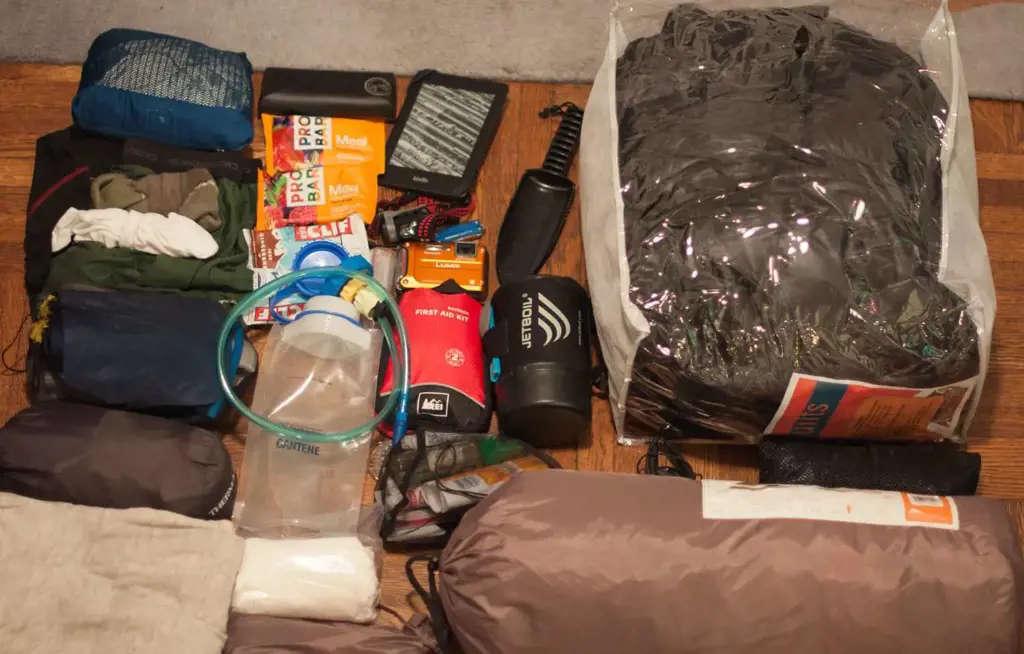
When planning for an overnight hike, it is important to pack essential items that will help ensure your safety, comfort, and survival in the wilderness. Whether you are a seasoned hiker or new to backpacking, the following items are crucial for a successful overnight hike.
- Backpack: Choose a backpack that is comfortable, fits properly, and has enough capacity to hold all your gear. Look for a pack with adjustable straps, support belts, and multiple compartments for organizing your belongings.
- Tent: A lightweight, durable, and weather-resistant tent is essential for providing shelter during your overnight hike. Look for a tent that is easy to set up and offers sufficient space for you and your gear.
- Sleeping bag and sleeping pad: A high-quality sleeping bag and sleeping pad are crucial for a good night's sleep. Opt for a lightweight and compact sleeping bag that offers the right temperature rating for your trip. A sleeping pad will provide insulation and cushioning, enhancing your overall comfort.
- Clothing: Pack appropriate clothing for the weather conditions you will encounter during your hike. Layering is key to managing your body temperature. Include a moisture-wicking base layer, insulating mid-layer, and a waterproof and breathable outer layer. Don't forget to pack extra socks, underwear, and a hat to protect against the elements.
- Food and water: Carry an ample supply of water and pack lightweight, nutritious food that is easy to prepare. High-energy snacks and dehydrated meals are popular backpacking options. Consider water purification methods such as filters, tablets, or a lightweight stove for boiling water.
- Navigation tools: A map, compass, and GPS device are essential for navigating through unfamiliar terrain. Familiarize yourself with the route beforehand and have a backup plan in case of detours or emergencies.
- First aid kit: Accidents can happen, so be prepared with a well-stocked first aid kit. Include items such as bandages, adhesive tape, pain relievers, antiseptic wipes, and any necessary prescription medications.
- Emergency essentials: Pack a headlamp or flashlight, extra batteries, a whistle, a lightweight emergency blanket, a fire starter, and a multi-tool. These items can be crucial in case of emergencies or unexpected situations.
- Personal hygiene items: Include a small towel, biodegradable soap, hand sanitizer, toilet paper, and a trowel for proper waste disposal. Respect Leave No Trace principles and properly dispose of all waste.
- Miscellaneous items: Consider packing items such as a camera, binoculars, a journal, and a book or playing cards for entertainment during downtime.
Before any hike, it is essential to research the trail conditions, weather forecasts, and any specific regulations or permits required for your destination. Proper planning and preparation will ensure a safe and enjoyable overnight hike. Remember to pack only what is necessary for your trip and keep your backpack as light as possible to minimize strain on your body. Happy hiking!
The Essential Packing Guide for a Trip to Farmington
You may want to see also

How do I determine what clothing and footwear is appropriate for an overnight hike?
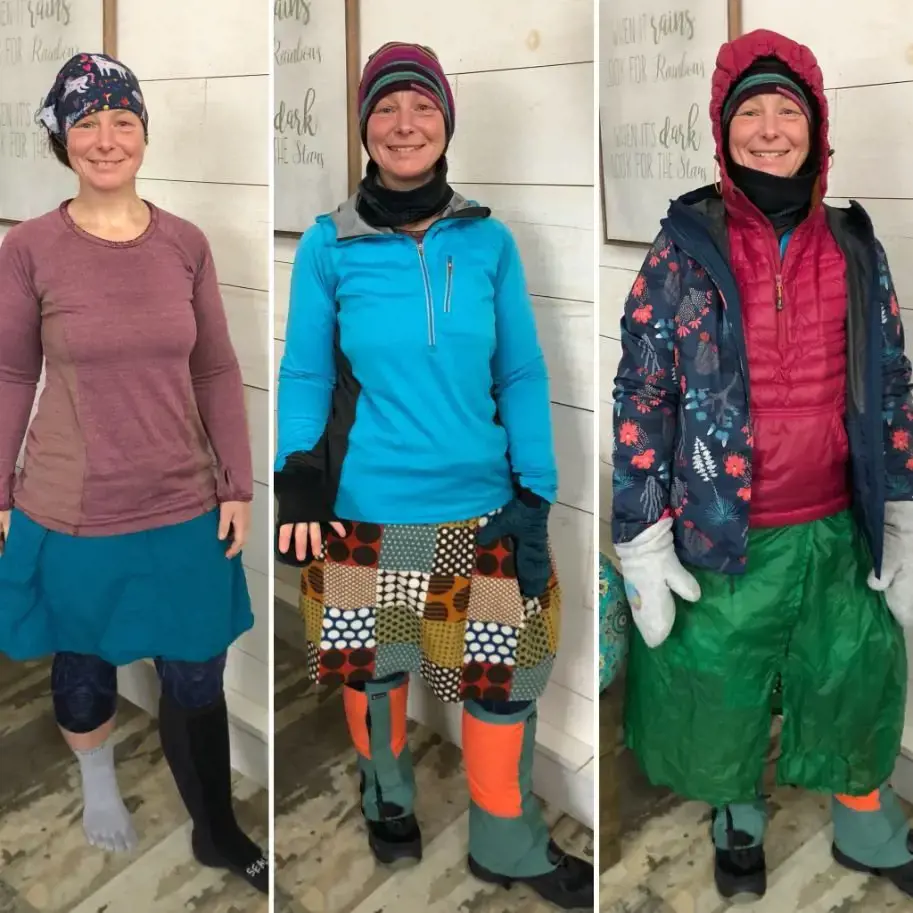
When preparing for an overnight hike, it is important to choose clothing and footwear that will keep you comfortable and protected in various outdoor conditions. The right gear can help prevent injuries, regulate body temperature, and provide adequate support for the duration of your hike. Here are some steps to determine what clothing and footwear are appropriate for an overnight hike:
- Research the Weather and Terrain: Before embarking on your hike, find out the weather conditions and terrain of the area you will be exploring. This information will guide your gear choices. For instance, if you expect rain, you will need waterproof clothing and footwear. If you will be hiking in rocky or uneven terrain, you should consider boots with ankle support.
- Layering: Layering your clothing is the key to staying comfortable during an overnight hike. Choose moisture-wicking base layers, such as synthetic or merino wool shirts and pants, to keep your skin dry. These materials will also help regulate your body temperature by keeping you cool in hot conditions and warm in colder environments. Add insulating layers like fleece or down jackets for warmth and a waterproof shell for protection against wind and rain.
- Consider Weight and Packability: Since you will be carrying your gear throughout the hike, it is essential to choose lightweight and packable clothing. Opt for items made from lightweight materials without compromising durability and functionality.
- Footwear: Selecting the right footwear is crucial for comfort and foot support during an overnight hike. Consider the length and difficulty of the trail, as well as personal preferences. Hiking boots provide ankle support and protection for rough terrains, while trail shoes are suitable for less demanding hikes. Look for a good fit, ample cushioning, and a supportive sole with good traction.
- Socks: Socks play a significant role in keeping your feet dry and blister-free. Choose moisture-wicking and quick-drying socks made of materials like merino wool or synthetic blends. Avoid cotton socks, as they retain moisture and can lead to blisters. Consider bringing an extra pair of socks in case of wet conditions.
- Accessories: Don't forget to bring essential accessories that can enhance your comfort and protection. These may include a hat or cap to shield your face from the sun, gloves for warmth in colder temperatures, and sunglasses to protect your eyes from UV rays.
Examples of suitable gear for an overnight hike:
- Base layer: Merino wool long-sleeve shirt and pants
- Insulating layer: Fleece jacket
- Outer layer: Waterproof shell jacket and pants
- Bottoms: Hiking pants or convertible pants
- Footwear: Hiking boots with ankle support and good traction
- Socks: Moisture-wicking merino wool socks
- Accessories: Sun hat, gloves, and sunglasses
Always remember to test your gear before the hike to ensure proper fit and functionality. This will help identify any discomfort or issues that may arise during the hike. Ultimately, the clothing and footwear you choose should prioritize comfort, protection, and adaptability to different weather conditions and terrains. Proper preparation and gear selection will make your overnight hike a more enjoyable and safe experience.
Essential Clothing Guide for Women Traveling to the Middle East
You may want to see also

Are there any specific food and water supplies I should pack for an overnight hike?
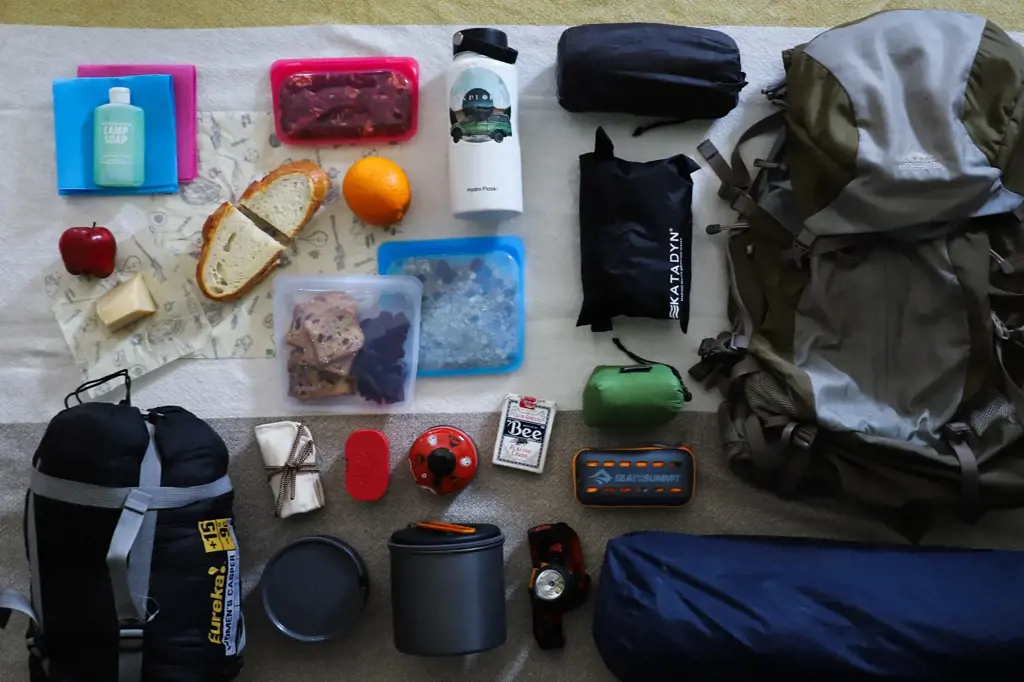
When embarking on an overnight hike, it is essential to pack appropriate food and water supplies to ensure you stay hydrated and nourished throughout your journey. Failing to do so could lead to dehydration, fatigue, and an overall unpleasant experience. In this article, we will guide you on what specific food and water supplies you should pack for an overnight hike based on scientific guidelines and personal experiences.
Water is the most crucial item to pack for any hike, as staying hydrated is essential for maintaining overall health and well-being. The amount of water you should carry depends on factors such as the length and intensity of the hike, weather conditions, and your personal needs. The general rule of thumb is to carry at least 2 liters of water per person per day. However, this amount may vary, and it is always better to carry more water than you think you might need, especially if you are unsure of the availability of water sources along the trail.
In addition to water, it is also advisable to pack a water filtration or purification system. This will allow you to safely drink from natural water sources such as rivers or streams if you run out of water or need to refill your bottles. There are various options available, including water filters, purification tablets, or water treatment devices. Investigate these options and choose the one that best suits your needs and preferences.
When it comes to food, it is important to focus on packing lightweight, energy-dense, and non-perishable options. These types of foods will provide you with the necessary nutrients and fuel to keep going during your hike. Here are some examples of food items you should consider packing:
- Trail Mix: A mixture of nuts, dried fruits, and seeds provides a good balance of protein, healthy fats, and carbohydrates.
- Energy Bars: Look for bars that are specifically designed for hiking and contain a mix of carbohydrates and protein. They are easy to pack and provide long-lasting energy.
- Dehydrated Meals: Pre-packaged dehydrated meals are lightweight, easy to prepare, and come in a variety of flavors. They usually just require boiling water to rehydrate.
- Jerky: Dried meat or vegan jerky is a good source of protein that doesn't require refrigeration.
- Nut Butter: Peanut or almond butter is a great source of healthy fats and protein. Individual packets are convenient and mess-free.
- Instant Oatmeal: Lightweight and versatile, instant oatmeal can be prepared with hot water for a filling and nutritious breakfast or snack.
- Fruits and Vegetables: Choose lightweight options such as apples, oranges, or cherry tomatoes that can withstand the rigors of the hike.
Remember to pack a sufficient amount of food based on the length of your hike and the energy expenditure you anticipate. Aim for a well-balanced mix of protein, carbohydrates, and healthy fats to keep you fueled and satisfied.
Lastly, it is important to pack your food and water supplies in a way that protects them from moisture and damage. Consider using resealable plastic bags or dry bags to keep your items fresh and prevent leaks. Distribute the weight evenly in your backpack to ensure comfort during your hike.
In conclusion, packing the right food and water supplies for an overnight hike is crucial for your safety and enjoyment. Carry an adequate amount of water, considering factors such as hike length and weather conditions, and also pack a water filtration or purification system. Opt for lightweight, energy-dense, and non-perishable food options to provide sustenance throughout your journey. Remember to pack the food and water supplies in a way that protects them from damage. With the right supplies in hand, you can embark on your overnight hike prepared and ready to savor the beauty of nature.
Essential Items to Pack for a C-Section Birth
You may want to see also

What safety equipment should I bring on an overnight hike?
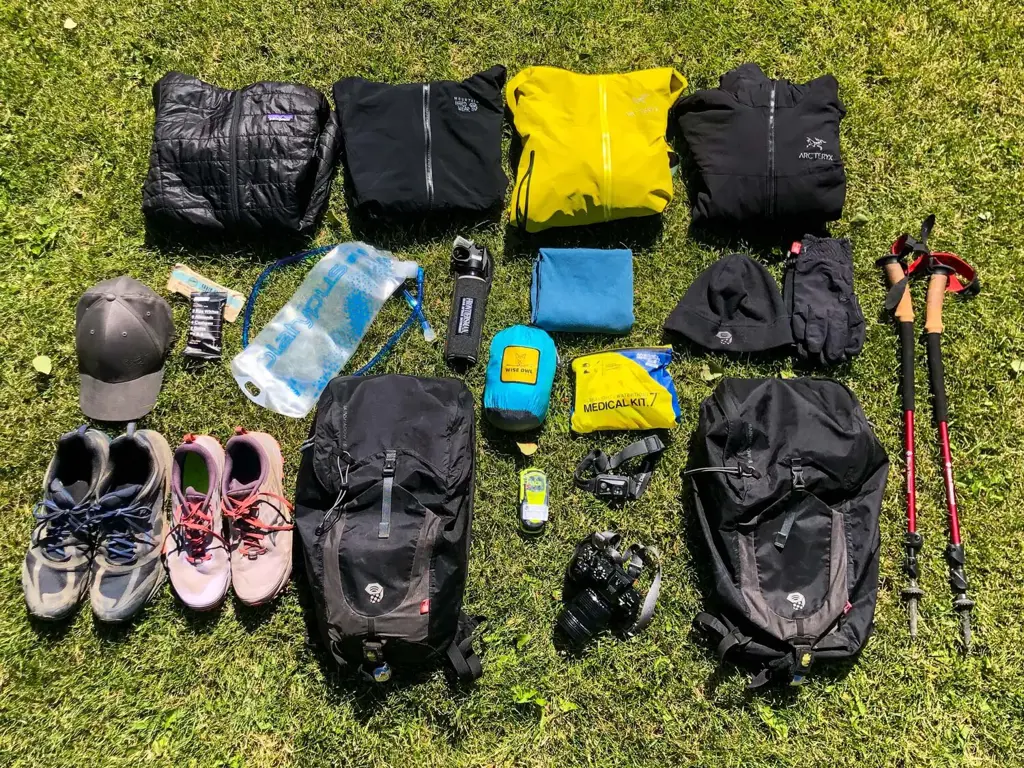
When planning for an overnight hike, ensuring your safety should be a top priority. One of the crucial aspects of staying safe in the wilderness is having the right safety equipment on hand. While the specific gear you'll need can vary depending on the trip's location and duration, there are several essential items that should be included in any overnight hiking kit. In this article, we will discuss the safety equipment you should bring on an overnight hike, from first aid supplies to navigation tools.
First and foremost, a well-stocked first aid kit is a must-have for any outdoor adventure. Your first aid kit should include basic medical supplies such as adhesive bandages, gauze pads, antiseptic ointment, and pain relievers. Additionally, it's a good idea to pack any necessary personal medications, such as inhalers or EpiPens, as well as any specific items you might need, like blister pads for foot care. A first aid manual can also be invaluable, providing guidance on how to handle various injuries and illnesses that may occur on the trail.
In addition to a first aid kit, you should also bring along navigation tools to help keep you on track during your hike. A map and compass are essential, even if you're planning to rely heavily on GPS or smartphone navigation. Electronic devices can fail or lose signal in remote areas, so having a backup method of navigation is crucial. Make sure you're familiar with how to use a compass and read a topographic map before setting off on your hike.
Another important piece of safety equipment to bring on an overnight hike is a reliable source of light. A headlamp or flashlight is essential for nighttime navigation, as well as for any emergencies that may arise. Opt for lightweight and durable options that are easy to pack and have a long battery life. Don't forget to bring extra batteries or a power bank to ensure your light source doesn't run out of power when you need it most.
Furthermore, it's crucial to pack appropriate clothing and gear for the conditions you'll encounter on your hike. This includes items such as a waterproof and breathable jacket, sturdy hiking boots, and moisture-wicking base layers. Hypothermia and heat exhaustion are serious risks in the wilderness, so it's important to dress in layers that can be easily adjusted to regulate your body temperature. Additionally, bring a hat, sunglasses, and sunscreen to protect yourself from the sun's harmful rays.
When planning an overnight hike, it's also wise to pack emergency shelter options. A lightweight tent or tarp can provide protection from the elements if you're unable to reach your planned campsite or encounter unexpected weather conditions. This simple piece of equipment can make a significant difference in your safety and comfort during an unplanned overnight stay in the wilderness.
Lastly, don't forget to bring sufficient food and water for the duration of your hike. You'll need energy to fuel your body and stay hydrated during the trek. Pack lightweight, high-calorie foods that are easy to prepare and won't spoil quickly. Water is essential, but carrying large quantities can be impractical, so consider bringing a water filtration system or purification tablets to treat water from streams or other natural sources along the way.
In conclusion, when preparing for an overnight hike, it's essential to bring the right safety equipment. A well-stocked first aid kit, navigation tools, a reliable source of light, appropriate clothing and gear, emergency shelter options, and sufficient food and water are all essential items to include in your hiking kit. By being prepared and having the necessary equipment, you'll be better equipped to handle any unexpected situations that arise, ensuring a safe and enjoyable outdoor adventure.
Essential Packing Checklist for Exploring Cape York
You may want to see also

How should I pack my backpack for maximum comfort and efficiency during an overnight hike?
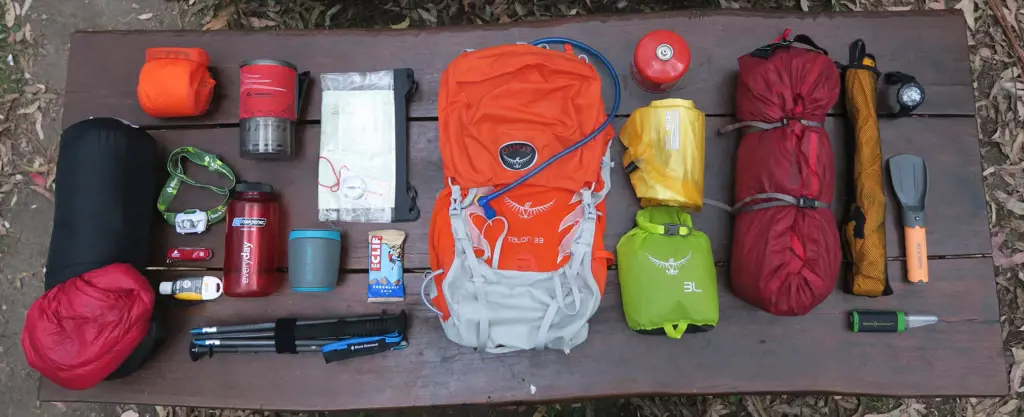
How to Pack Your Backpack for a Successful Overnight Hike
Packing your backpack properly is crucial when embarking on an overnight hike. It not only maximizes comfort but also ensures efficiency throughout your journey. In this article, we will discuss step-by-step how you should pack your backpack for maximum comfort and efficiency during an overnight hike using scientific principles and practical experience.
Choose the Right Backpack:
Before discussing how to pack your backpack, it is important to ensure that you have the right backpack for your overnight hike. Choose a backpack that is suitable for the duration of your hike, has a comfortable hip belt and shoulder straps, and offers enough space for your gear and supplies.
Plan Your Gear:
Make a checklist of the essential gear you will need for your overnight hike. This may include a tent, sleeping bag, sleeping pad, cooking equipment, food, clothing, and personal items. Consider the weather conditions and terrain of your hike to determine what specific gear you will need.
Distribute the Weight:
One of the most important aspects of packing your backpack is distributing the weight properly. It is recommended to place heavy items, such as your sleeping bag, near the bottom of the backpack, close to your back. This lowers the center of gravity, resulting in better balance and stability. Lighter items, such as clothing or food, should go towards the top of the backpack.
Use Compression Sacks:
Compression sacks help in compressing clothing and reducing the overall volume of your gear. This allows for more efficient use of space in your backpack. Roll or fold your clothes tightly and use compression sacks to minimize their size.
Utilize Pockets and Compartments:
Most backpacks come with multiple pockets and compartments; make use of them wisely. Organize your gear in different compartments based on their categories. For example, keep your cooking equipment and food in one compartment, and your toiletries and personal items in another. This makes it easier to locate items quickly when needed.
Keep Essentials Handy:
Items that you might need during the hike, such as a map, compass, sunscreen, insect repellent, or a rain jacket, should be easily accessible. Utilize the outer pockets or attach small pouches to the shoulder straps for quick access to these essentials without having to unpack your entire backpack.
Secure Loose Items:
To prevent items from shifting or falling out of your backpack, secure them using carabiners, compression straps, or small dry bags. This ensures that your gear remains intact and organized throughout the hike.
Consider Weight Distribution:
While packing your backpack, it is essential to maintain a balanced weight distribution. Place heavier items towards the center of your backpack, close to your back. This prevents the backpack from pulling you backward or causing strain on your shoulders.
Adjust Straps and Fit Properly:
Before hitting the trail, adjust the straps on your backpack to ensure a proper fit. Tighten the hip belt to transfer weight from your shoulders to your hips, which can significantly reduce strain and fatigue. Adjust the shoulder straps to find a comfortable fit that allows for a full range of motion.
By following these steps, you can pack your backpack for maximum comfort and efficiency during an overnight hike. Remember to consider the specific requirements of your trip, your personal preferences, and the advice of experienced hikers when organizing your gear. Properly packed, your backpack will provide you with a comfortable and enjoyable hiking experience.
Essential Items to Pack for Your Trip to Egypt
You may want to see also
Frequently asked questions
When going on an overnight hike, it is important to pack the necessary essentials to ensure a safe and successful trip. Some essential items to pack include a tent or sleeping bag, a camp stove and cooking utensils, a first aid kit, a headlamp or flashlight, extra clothing and layers, and enough food and water for the duration of the hike.
The amount of food and water you bring on an overnight hike will depend on the length and intensity of the hike, as well as personal preference. As a general guideline, it is recommended to bring at least 2 liters of water per day for drinking and cooking purposes. For food, pack lightweight, non-perishable items such as energy bars, trail mix, and dehydrated meals. You should also consider bringing a water filter or purification tablets to treat water found along the trail.
When packing clothing for an overnight hike, it is important to consider the weather conditions and temperature of the area you will be hiking in. It is recommended to bring moisture-wicking and quick-drying clothing made from synthetic materials, such as nylon or polyester. Layering your clothing is key, as it allows you to adjust your body temperature as needed. Make sure to pack a lightweight but warm jacket or fleece, a hat and gloves for colder weather, and a rain jacket or poncho for wet conditions. Don't forget to also pack extra socks and sturdy, comfortable hiking boots.







